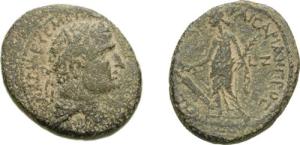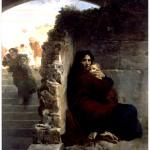[excerpt from my book, The Word Set in Stone: How Archaeology, Science, and History Back Up the Bible (Catholic Answers Press: March 15, 2023, 271p), pp. 204-206]
*****
How about a more “dramatic” and seemingly “fantastic” (and Old Testament-like) alleged event, such as Herod (Agrippa) being “eaten by worms” (Acts 12:21–23)? Christians can’t possibly defend that, can they?
Actually, we can plausibly do so. Jewish-Roman historian Josephus provides a corroborating parallel account:
Now when [Herod] Agrippa had reigned three years over all Judea . . . he exhibited shews, in honor of Cesar. . . . And presently his flatterers cried out . . . that “he was a God.” And they added, “Be thou merciful to us. For although we have hitherto reverenced thee only as a man, yet shall we henceforth own thee as superior to mortal nature.” Upon this the king did neither rebuke them, nor reject their impious flattery. . . . A severe pain also arose in his belly; and began in a most violent manner. . . . His pain was become violent. Accordingly he was carried into the palace. . . . And when he had been quite worn out by the pain in his belly, for five days, he departed this life. (311)
Some might counter Josephus’s account by saying that it has nothing directly to do with “worms” and so is irrelevant. But it can’t be ruled out, since there is a condition called ascariasis, in which roundworms can become parasites in human intestines. A Mayo Clinic article states,
Most infected people have mild cases with no symptoms. But heavy infestation can lead to serious symptoms and complications. . . .
The larvae mature into adult worms in the small intestine, and the adult worms typically live in the intestines until they die. (312)
A scientific article on this condition confirms that it can indeed be fatal: “In some rare cases, ascariasis may cause serious consequences” and “even sudden death.” (313)
Other medical conditions also entail worms or similar creatures infesting the human body. Myiasis involves “the infection of a fly larva (maggot) in human tissue.” (314) Histopathologist A.T. Sandison wrote an article about Herod the Great’s death and also speculated that myiasis could have been the cause:
Herod Agrippa I, grandson of Herod the Great, died in somewhat similar circumstances to his grandfather in A.D. 44. He developed abdominal pain while at the theater and died within five days. . . . Josephus does not mention myiasis in this case but in Acts (12:23) we read that “he was eaten of worms.” (315)
We see, then, that “eaten by worms” is not some fantastical and mythical account that can be immediately dismissed with derision. The Bible, in its usual phenomenological, pre-scientific language, describes a death in blunt and revolting terms, which correspond with at least two known conditions in which worms or other parasites literally eat the interior of the human body. The biblical description, strikingly corroborated by Josephus, is (far from being impossible) entirely plausible, understood as myiasis or ascariasis. In other words, known reputable history and solid science offer confirmation of what might—not knowing of these evidences—be seen as an improbable or impossible death.
FOOTNOTES
311 Josephus, Antiquities of the Jews, Book XIX, ch. 8, sec. 2.
312 “Ascariasis,” Mayo Clinic.
313 Quan-yue Li et al., “Life-threatening complications of ascariasis in trauma patients: a review of the literature,” World Journal of Emergency Medicine 5(3) (2014), 165-170.
314 “Parasites—Myiasis,” Centers for Disease Control and Prevention.
315 A.T. Sandison, “The last illness of Herod the Great, king of Judaea,” Medical History Oct; 11(4) (1967), 381-388.
Practical Matters: Perhaps some of my 4,300+ free online articles (the most comprehensive “one-stop” Catholic apologetics site) or fifty-three books have helped you (by God’s grace) to decide to become Catholic or to return to the Church, or better understand some doctrines and why we believe them.
Or you may believe my work is worthy to support for the purpose of apologetics and evangelism in general. If so, please seriously consider a much-needed financial contribution. I’m always in need of more funds: especially monthly support. “The laborer is worthy of his wages” (1 Tim 5:18, NKJV). 1 December 2021 was my 20th anniversary as a full-time Catholic apologist, and February 2022 marked the 25th anniversary of my blog.
PayPal donations are the easiest: just send to my email address: [email protected]. You’ll see the term “Catholic Used Book Service”, which is my old side-business. To learn about the different methods of contributing, including 100% tax deduction, etc., see my page: About Catholic Apologist Dave Armstrong / Donation Information. Thanks a million from the bottom of my heart!
***
Photo credit: Classical Numismatic Group, Inc. http://www.cngcoins.com, 2006: JUDAEA, Herodian Kings. Herod Agrippa I. 37-43 CE. Æ 22mm (9.02 g, 1h). Caesarea Maritima mint. Dated RY 7 (42/3 CE). Coin with Herod Agrippa I’s likeness. [Wikimedia Commons / Creative Commons Attribution-Share Alike 3.0 Unported license]
***
Summary: The Bible in the Book of Acts stated that King Herod Agrippa I was “eaten by worms.” Is this an impossible fantastic myth or is there an actual scientific possibility?














